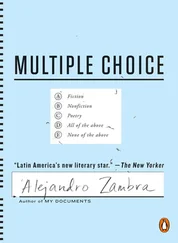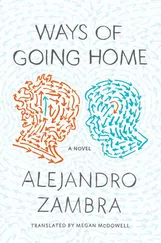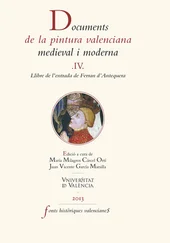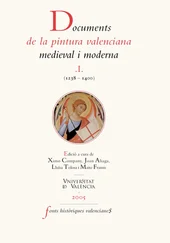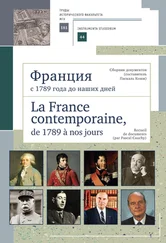Just when sleep is about to overcome him, the alarm clocks go off; it’s five in the morning. Martín gets up to help the family with their suitcases. Sofí comes downstairs, sulking, but right away she finds, who knows where, a surge of energy. Mississippi is nowhere to be seen and Sofí wants to say good-bye. She cries for two minutes but then stops, as if she has simply forgotten she was crying. When the taxi arrives she insists she wants to finish her cereal, but then leaves the bowl almost untouched.
“Kill all the robbers,” she tells Martín before getting into the car.
“And what should I do with the ghosts?”
“Martín is joking,” says Consuelo immediately, throwing him a nervous look. “There are no ghosts in the house — that’s why we bought it, because we were guaranteed there were no ghosts. And not in France either, in the house where we’re going to live.”
As soon as they are gone, Martín stretches out in the big bed, which is still warm. He searches in the sheets for Consuelo’s perfume or the smell of her body, and he sleeps facedown, breathing deeply into the pillow, as if he’s discovered an exclusive and dangerous drug. The noise of the street starts up, the commotion of people going to work, the school buses, the motors revved by drivers anxious to avoid the traffic. He dreams that he’s in the waiting room of a hospital and a stranger asks him if he’s gotten his results yet. Martín is waiting for something or waiting for someone, but in the dream he doesn’t remember exactly what or who and he doesn’t dare ask, but he knows that what he’s waiting for isn’t test results. He tries to remember, and then he thinks, It’s a dream, and he tries to wake up, but when he wakes he is still in the dream and the stranger is still waiting for an answer. Then he wakes up for real and feels the immense relief of not having to answer that question, of not having to answer any questions. The cat is yawning at the foot of the bed.
He unpacks his suitcase in the master bedroom, but there’s not much room in the wardrobes. There are several plastic bags and boxes full of clothes meticulously packed up, but there are also some unboxed garments. He finds an old Pixies T-shirt with the cover from Surfer Rosa on it. “You’ll think I’m dead, but I’ll sail away,” he thinks — of course, that’s from a different album, he’s got it wrong. He tries to picture Consuelo in that shirt and he can’t, but it’s a medium so it must be hers and not Bruno’s. In any case, he puts it on — he looks funny, it’s too tight on him. Wearing only the T-shirt and a pair of sweatpants, he heads out to the nearest supermarket, where he buys coffee, beer, noodles, and ketchup, plus some cans of horse mackerel for Mississippi, because he’s hatched a demagogical plan, thinking the cat will see the situation like this: they’re gone, they left me alone with a stranger, but I sure am eating great. He comes back practically dragging the bags: it’s several blocks away and he knows he should have taken the car, but he’s terrified of driving. Back in the house, as he’s putting away the groceries in the kitchen, he looks at the cereal and milk the girl left behind. He finishes what’s left of the girl’s bowl, while thinking that he can count on the fingers of one hand the times he’s eaten cereal. Men from my generation don’t eat cereal, he thinks — unless their children eat it, unless they are fathers. When did they start selling cereal in Chile? The nineties? Suddenly, this question seems important. He sees an image of himself as a child, drinking a glass of plain milk, like he always did, and then rushing off to school.
Afterward, he inspects the second floor, where Bruno’s study is — a large room, perfectly illuminated by a skylight, with books in strict alphabetical order, countless desk supplies, and degrees on the wall: undergraduate, master’s, doctorate, all hanging in a line. Next he takes a look at the girl’s room, full of drawings, decorations, and, on the bed, some stuffed animals with their names written on tags. She’s taken some of her animals with her, but they’ve made her store others in her closet or chest; she left five on her bed and insisted on giving them name tags so Martín could identify them (one brown bear wearing sports clothes catches his attention — its name is Dog). Then he finds, in the upstairs bathroom, in with a pile of magazines, a pamphlet with sheet music for beginners. He goes downstairs and sits at the electric piano, which doesn’t work; he tries to fix it, with no luck. Still, he reads the music and presses the keys. He has fun imagining that he is an impoverished piano player, one with no money to pay the electricity bill who has to practice like this, by touch.
The first two weeks pass uneventfully. He lives just as he had planned. At first the days seem eternal, but gradually he fills them with certain routines: he gets up at nine, feeds Mississippi, and, after breakfast (he goes on eating cereal after he discovers a love for Quaker Oatmeal Squares), he goes into the garage, starts the car’s motor, and plays a bit with the accelerator, like a pilot waiting for the signal to take off. At first he moves the car timidly, but then he dares to take it out for a spin, for multiple spins, each one longer than the last. When he comes back, he tunes the radio to the news, opens the window in the living room, and turns the hourglass upside down; while the grains, the minutes, fall, delicately and decisively, he smokes the day’s first cigarette.
Then he watches TV for a few hours, and the effect is narcotic. He comes to feel affection for the rhetoric of the morning shows, of which he becomes something of a scholar; he compares them, considers them seriously, and he does the same with the celebrity shows. Those take a bit more effort, because he doesn’t know the characters — he’s never paid attention to that world — but eventually he comes to recognize them. He eats his lunch of noodles with ketchup in bed, always watching TV.
The rest of the day is uncertain, but it tends to be spent walking. He has a rule not to go to the same café twice, or to buy his cigarettes from the same corner shop, in order to avoid building any sense of familiarity: he has the vague impression he is going to miss this life, which isn’t the life he’s dreamed of but is a good life nonetheless; it is a beneficial, restorative time. But all of that changes the afternoon he discovers that the cat has disappeared. It’s been at least two days since he’s seen Mississippi, and the bowl of food is untouched. He asks around with the neighbors: no one knows anything.
He spends several hours desperate, frozen stiff, not knowing what to do. In the end he decides to make a flyer. He searches on the computer erratically, incoherently, for a photo of Mississippi, but he finds nothing; before leaving, Bruno cleared all personal files from the hard drive. Anxiously, he ransacks the entire house, taking a certain pleasure in the disarray, the chaos he is sowing. He searches carelessly through trunks, bags, and boxes, dozens of books, flipping frenetically through the pages, or shaking them with something like rage. He finds a little red suitcase hidden in the wardrobe of the study. Instead of money or jewelry it holds hundreds of family photos, some of them framed and others loose, some with dates on the back of them and even some short, loving messages. He likes one photo in particular, a large one in which Consuelo poses, blushing, with her mouth open. He takes a diploma Sofí received from a swimming course out of its frame and replaces it with the photo of Consuelo, and then he hangs it on the main wall of the living room. He thinks that he could spend hours stroking that straight, black, shining hair. Since he can’t find any photos of Mississippi, he searches online for images of gray cats and chooses one at random. He writes a brief message, prints some forty copies, and puts them up on lampposts and trees all along the street.
Читать дальше

